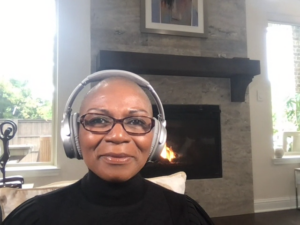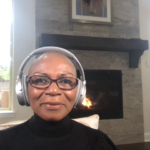Description
Lisa Williams (56) talks with her colleague Sharon Cooper (68) about her work in the military and the federal government, and how that influenced her work at Living Water, which provides refuge and resources to women and girls who are survivors of trafficking. Lisa discusses vicarious trauma and advocates for building futures for survivors.Subject Log / Time Code
LW talks about when she was seven years old, she had to be the protector and advocate for two younger relatives and herself. At 17, she joined the Air Force, where she realized her goals of advancement and leadership, which led to her becoming a commissioned officer.
LW says that her time in the military informed her work with Living Water, it gave her a sense of discipline and to realize the goals and objectives of Living Water. SC reflects on how her service influenced her as well.
LW talks about making the decision to dissolve her nonprofit and create three separate endowments. She explains that she was in a health crisis and invested in herself in an intentional way.
LW talks about vicarious trauma and making the decision to take care of herself so she could continue to serve the people she cared about.
SC talks about how people who have been exploited have often gone through victimization throughout their childhood. She talks about the science of how that trauma affects the body.
SC says that it took a lot of effort for this country to view its survivors of sex trafficking as victims and not criminals.
LW talks about working closely with the IAmRachel campaign and working on policy with students, clergypeople, etc. It was the first Safe Harbor law in the nation, and the first to be named after a living survivor of trafficking.
SC talks about writing her own medical textbook on how to care for and treat survivors of online sex trafficking. She talks about collaborating with a woman on a chapter for journalists to write about this type of exploitation.
L says it is not enough to rescue girls and boys. She says it is not right to not help the family together in healing towards wholeness. She also discusses the importance of building a future for survivors when they are ready, which meant putting together a scholarship.
L talks about ensuring that the work continues after she is gone, and stresses the importance of having created a system that is bigger than her, and bigger than the problem. She discusses the partnership with Boston University.
She reflects on the fact that we have all the tools to prevent this from happening again, but she asks if we have the integrity to stop it, and also asks if we value every life the same.
She hopes to be remembered for standing alongside other survivor leaders.
Participants
- Lisa Williams
- Sharon Cooper


